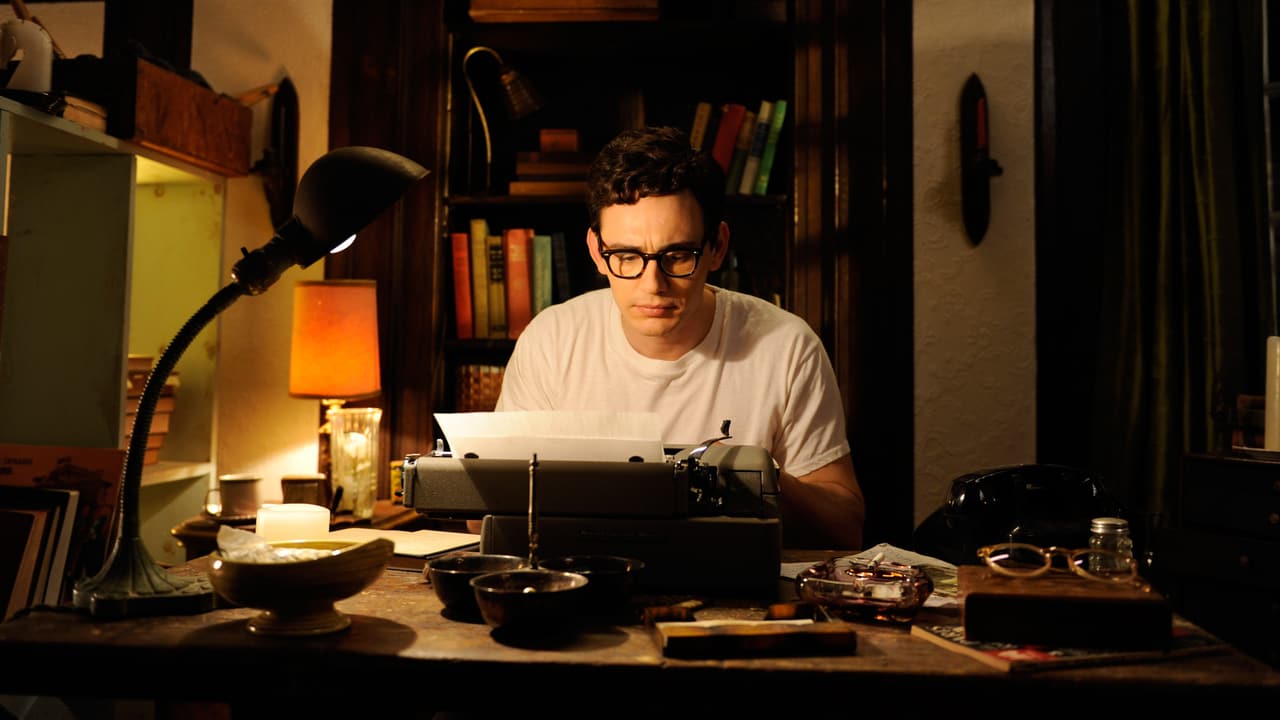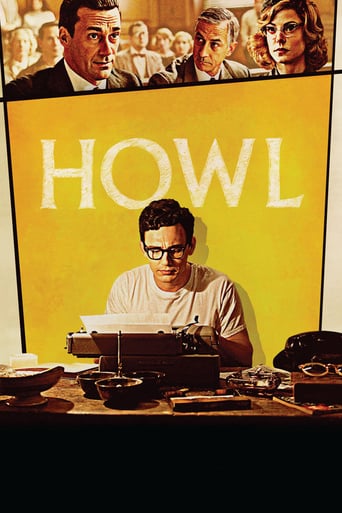

Crappy film
... View MoreIt is interesting even when nothing much happens, which is for most of its 3-hour running time. Read full review
... View MoreOne of the most extraordinary films you will see this year. Take that as you want.
... View MoreClose shines in drama with strong language, adult themes.
... View MoreThe film starts with the interesting claim that every word spoken was actually spoken.The film isn't a documentary, though it is very similar to one. It centers on several key events so that no dialog needs to be added beyond the historical. A reading of "Howl", the obscenity trial, and two interviews. Each is shown in parts to create a narrative with the suspense being the outcome of the trial. We see the courtroom, the defendant's lawyer, Jake Ehrlich (Jon Hamm) and prosecutor Ralph McIntosh (David Strathairn), Judge Clayton Horn (Bob Balaban) and several of the expert witnesses. Here the debate was whether "Howl" was obscene and thus the book store owner was guilty of selling "obscene" literature. We also hear interviews of Ginsberg as he gives background information on himself and his poem. Eventually, of course, the poem is not ruled as obscene and the bookstore owner is let go. Several more intimate moments about Ginsberg's life, particularly his relationship with his mom are seen. It's nice to see Franco portray Ginsberg and attempt to imitate his distinct idiolect and mannerisms. Ginsberg always had a unique way of talking, perhaps a product of his New York, Jew upbringing or perhaps because of his experiments with drugs, jazz, and performing arts. The movie is a more intimate portrait of Ginsberg than I was expecting. I felt that they probably put too much emphasis on his relationship with his mother. A lot of lobotomies were performed at the time, and abuses in mental health care continue to this day. I would hardly put the guilt on Ginsberg, an icon of counterculture. Furthermore, I liked how Ginsberg was portrayed as a struggling artist. His success came, but it took some work. I also really liked the cartoons that were used to illustrate the poem. I found they complimented the emotional exploration of the film. I'm not sure I would recommend this to anyone who's not a fan of Beat Literature, but I did enjoy it. Of course, I'm a fan of the Beats.
... View MoreHowl is truly an enigma: It didn't do well at the Hollywood box office, but it soared overseas. From what I hear, the Hollywood audience wasn't quite ready for the intergenerational theme imbued in the film. Well, I say the Hollywood audience was being stubborn. This film handles the theme quite tastefully, and there are no Lolita-like gratuitous sex scenes or love scenes. In fact, Jeffrey Friedman (the director) makes sure that James Franco doesn't even get to see many kids around his neighborhood, so as not to make him seem like a weirdo.Mary-Louise Parker is absolutely wonderful in this film. It seems she decided to gorge on biryani and other delights, as she is chubby in the film, but in my opinion she looks gorgeous thick or thin. Todd Rotondi, who I think is one of the most underrated actors out there does an outstanding job portraying a conflicted Kerouac. Anupam Kher and Aaron Tveit round out the great performances. The music is fabulous, the story wonderful, and the acting superb.
... View MoreOne of the main arguments in Ginsberg's defense during his trial was that dissecting "Howl" line-by-line with the intent of extracting exact prose and literal meaning is a perversion of its existence and the method of which it was written. My question is; wasn't the decision to use illustrations, which quite literally attempted to depict his poems word-by-word displaying corresponding visuals, a contradiction to that very argument? These illustrative clips seemed more of a medium to keep the viewer visually stimulated and maintain interest during his narrations, rather than an endeavor to create a platform in which we can truly envision Ginsberg's true intent behind his powerful words while maintaining one of the most fundamental points of the movie, that narrow and literal interpretations of such work should be discouraged, rather, that we should be invited to dream our own envisionment of a poems content through personal interpretation and wild imagination. I was perfectly content picturing the "angelheaded hipsters burning for the ancient heavenly connection to the starry dynamo in the machinery of night" on my own, enhanced by the spirited performance and narration of James Franco; in the crease in his brow, his subtle confidence and strain in his voice. The illustrations, albeit expertly rendered, took away from what I thought the film was all about.
... View MoreRob Epstein and Jeffrey Friedman's 'Howl' is an interesting and humorous depiction of the 1957 trial regarding Allen Ginsberg's controversial poem 'Howl'. In between the trial we are given glimpses of Ginsberg's life (in black and white) and an interview with him. The black and white sequences are beautifully shot. The style reminds one of French movies from the 50s. The recital of the poems takes some getting used to but once it is coupled with the animated sequence there's no turning back. It brings the poetry to life. Those are the highlights of the film. Moreover the animation is beautifully done. The pacing is uneven as its slow at times (especially in the beginning). I would have liked to have seen more glimpses of Ginsberg's life. The actors do a fairly decent job. James Franco does a good enough job and he is well supported by David Strathairn, Jon Hamm, Bob Balaban, Alessandro Nivola and Mary-Louise Parker. Overall, 'Howl' is an intriguing account and does quite well in introducing Ginsberg's poems to those who are not familiar with his works. The animation gives it a unique touch.
... View More